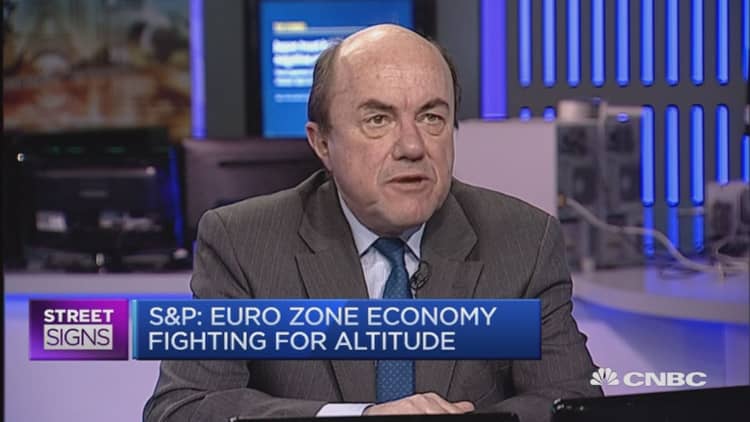


The euro zone economy is "flying on one engine," according to the chief European economist at ratings agency Standard and Poor's, which trimmed its growth and inflation forecasts for the euro zone.
In his latest report on Wednesday, S&P's Chief European Economist Jean-Michel Six likened the 19-country euro zone to a plane "flying on one engine" and "fighting for altitude" and said that while there are reasons to hope that the economy will pick up altitude, a "pre-crisis flight path" of robust growth is not likely.
Speaking to CNBC shortly after the report was published, Six said that a particular worry for Europe was foreign demand for its goods when the euro was strong. The euro is currently trading at 1.1327 against the dollar after the greenback fell back after dovish comments by Federal Reserve chair Janet Yellen on Tuesday.
Six said the strength of the euro concerned him in two ways.
"First of all, on the inflation side it is a concern because obviously until recently the euro was used by the ECB as one tool to try and lift imported inflation: a weaker currency means imported inflation is higher but that's no longer happening."
"The second thing (that concerns me) is export competitiveness. The euro we are looking at today is expensive, it's strong, it's probably too strong," he said.
Since the start of the year, Six noted in his report that global market turmoil had caused a "nosedive in financial conditions…(which) had taken some wind out of the euro zone economy" and although regional conditions had since improved – particularly due to what he called a "well-received" set of more accommodative measures from the European Central Bank – the euro zone relied too much on domestic consumption for growth.
'Suspicious recovery'
While the euro zone had seen its recovery "gathering momentum" over the last two years, Six warned that the "the current upswing in the euro zone has been a one-engine, consumer recovery."
To illustrate his point, Six noted that consumption represents 55 percent of the region's gross domestic product (GDP) and has accounted for a "whopping" 72 percent of economic growth since 2014. That dependence on consumption entailed risks, he said, although the euro zone might well get away with it.
In his report, Six noted that "a recovery that mainly relies on one cylinder is by definition suspicious: It could quickly grind to a halt, as it did in the previous cycle in 2010-2011. Or, it could be a flash in the pan, caused simply by a one-off drop in household energy bills."
"Although these concerns are valid, our view is that the fundamentals supporting the current upswing in consumer spending should prove resilient this year and next, held aloft by a pickup in wage growth and job creation, and ECB policy – to an extent."
Six told CNBC that as the ECB used a "larger and larger set of tools" to try to boost growth and inflation, only time would tell whether its bond-buying program was successful.
"Let's see what happens with this new asset-purchasing program and especially corporate bonds as of June. It (takes) time, if you look at the experience of QE (quantitative easing) in Britain and the U.S., these programs take time before you can really jump to a conclusion and say: 'well it worked or it didn't work.' The jury's still out."
'Pre-crisis flight path'
Despite some optimism for a continuing recovery, S&P trimmed its 2016 and 2017 growth and inflation forecasts for the euro zone and said a return to pre-crisis growth was unlikely.
It forecast the euro zone to grow 1.5 percent in 2016 (down from a prediction of 1.8 percent made last November) and 1.6 percent in 2017. It made more "substantial" revisions to its inflation forecasts, predicting 0.4 percent inflation this year versus 1.1 percent previously.
On a brighter note, S&P forecast that employment – which is worryingly difficult to find in parts of the euro zone – "should rise more meaningfully across the region in 2016 and 2017. We forecast the euro zone unemployment rate to average 10.2 percent this year (10.9 percent in 2015) and 9.7 percent in 2017."
"We continue to think that the recovery's underlying fundamentals are more resilient than the financial markets have recently suggested, but not so strong as to bring growth back to its pre-crisis flight path," he said, adding that central bank measures alone would not help the economy.
"In addition, we stress that central bank actions are having a diminishing impact on inflation and growth prospects, partly because some of the battles they're trying to fight are beyond their reach (low commodity prices, erratic swings in emerging markets currencies), and partly because they lack "air support" from governments, such as structural reforms to boost competitiveness and the efficiency of labor markets."
Follow us on Twitter: @CNBCWorld



